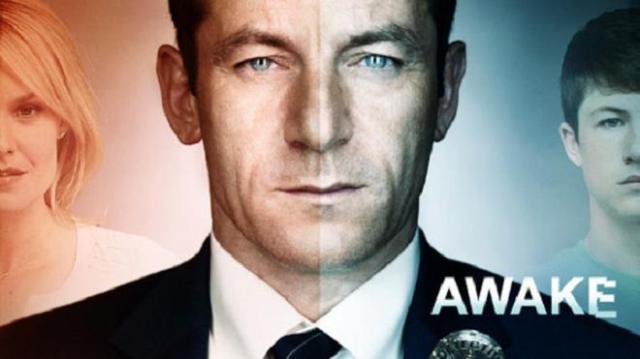I hope everyone enjoyed the Awake pilot last night (or over the past few weeks, thanks to NBC releasing it online fairly early). If you haven’t read my review, please consider doing that. But amid all the beaming reviews and superlatives for Awake, big questions remain: Is it a series? Can the story be maintained across multiple seasons or even these first 13 episodes?
These are great questions to ask and ones that Awake more or less dares you to ask, but as I watching the pilot for the third time in two days last night, I began to think to myself about the series’ sustainability and the “larger picture.” And by the time Awake’s narrative made it to that final sequence, I realized something: I don’t actually care if Awake can work as a series. Don’t get me wrong, I would love for it to, both for selfish reasons (I love great television) and so that Kyle Killen can keep a consistent job. But if it becomes clear by episode four or seven or 13 that Awake isn’t quite going to work as a long-term story, my sadness will eventually subside because any failure that comes after the pilot doesn’t automatically negate all the successes of said pilot. For me, every single post-pilot episode of Awake could be TERRIBLE and it wouldn’t really matter. I feel that exact same way about the Lone Star pilot, though its “failure” was out of the series’ and Killen’s control.
I’m wondering how other people feel about this. I understand that Awake’s pilot quality brings all sorts of expectations, and also fears that the series cannot meet those expectations. And in a time where we’re reviewing every episode and trying to simultaneously judge how it fits in with the past and predict what it means for the future, I have to guess that most folks would ultimately discard the pilot’s successes because of the series’ failures.
The ultimate impact of one episode is something that is really curious to me. Clearly, pilot’s set the tone for a series and they have to work on some level to hook the audience into the story. I’ve written before about how the greatness of one individual episode (like a finale) cannot rectify a season’s worth of problems, but I also think the opposite is true. A season’s worth of problems does not discount an individual episode’s strength and quality. That argument might be paradoxical in some ways, yet, I think it’s also true.
Perhaps this depends on the time that we look at an individual episode. At the end of a season, a great finale can fill us with positive emotions that might evaporate some of the nasty tastes in our mouth that the season shoved in there, leaving us to project a certain level of improvement that disregards the slew of issues. But if the ending or most recent episodes are troublesome, it tends to be difficult to look back as fondly on the strong points that came before. The recency effect is a fickle bitch, I guess. If the responses to the endings of Lost, Battlestar Galactica and The Sopranos have taught us anything, it is that.
Good analysis should consider context – the pilot is hopefully part of a larger whole, after all – but it should also be able to separate individual units from context, if only a little bit. For me, a great episode of television is a great episode of television. There is no level of subsequent failure that can strip away the heights an individual episode reaches. I might ultimately be disappointed with the whole, but singular parts still remain in my mind. I would never say I like something like American Horror Story as a whole, but there were two or three episodes in that first season that I completely adore and won’t soon forget.
This seems to be truer for great pilots, which can – and really, should – play like short films. In recent years, there have been a number of quality pilots that didn’t result in sustainable, great or even good series: the aforementioned Lone Star, The Walking Dead, The Nine, Heroes, FlashForward and Twin Peaks come to mind immediately. Heck even things like A Gifted Man or Modern Family struggle to live up to the quality that the pilot suggested. It happens, for dozens of reasons. But later troubles do not negate those early successes (just as later successes don’t negate early failures or whatever).
Awake, unfortunately, is likely to join this group, either because the story isn’t sustainable or because NBC doesn’t like the ratings (though it started “fine”). If that happens, it won’t take anything away from the pilot, at least for me. How do you feel? Do ultimate failures negate the positive feelings you had for a great first episode?


Leave a comment